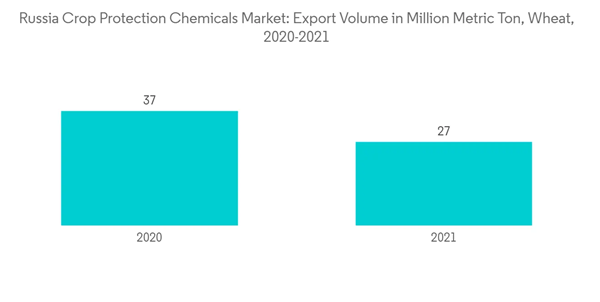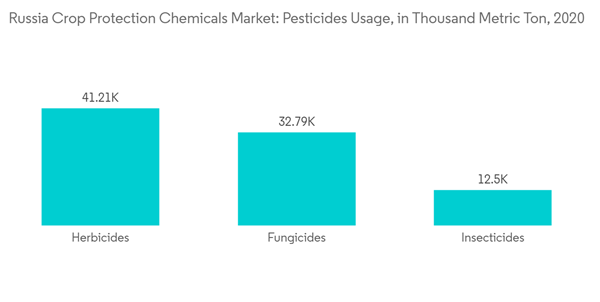Key Highlights
- The Russian government has approved a resolution to create a state information system to track pesticides and agricultural chemicals. The federal tracking system will make it possible to improve control over the safe handling of pesticides and agrichemicals. According to the FAO and the Russian Union of Producers of Crop Protection Chemical, about 30% of chemical substances are illegally imported, counterfeited, or unfit for use. Therefore, the emergence of a system for all agriculture is tremendously important for the traceability of pesticides and agrichemicals at all stages, which will positively impact the domestic market and Russia's export potential. This will help to strengthen the country's growth during the forecasting period.
- The crop protection development is impeded by acute competition from imports and a drop in prices of various agrochemical products. Due to the Russia-Ukraine war, many companies have paused their business units in the country and stopped supplying agricultural inputs to the farmers. However, due to the food crises, these companies slowly started opening businesses and resumed operating the supply units in the country. Despite the challenging environment, major players are expanding their presence in the region.
- The increase in exports of major grain and cereal crops such as wheat, corn, and barley and favorable government policies supporting its production and growing demand for food due to increasing population are some of the prime factors driving the market growth for crop protection chemicals in the country. These factors are boosting the growth of the market in the coming years.
Russia Crop Protection Chemicals Market Trends
Booming Agriculture Sector
Over the last decade, Russia has emerged from a net importer to a net exporter of grains and cereals. Wheat, Corn, and Barley are some of the major crops grown in the country. Russia is the world's largest wheat exporter, with 20% of the global share currently. It accounted for an average of 10% of global wheat production over the last five years. A reduction in export capacity from Ukraine and Russia and rising energy and fertilizer prices are pushing up international food prices, thereby threatening global food security and both countries, together with a 50% reduction in Russian wheat export could lead to a 34% increase in international wheat prices in the marketing year 2022. Both countries play a critical role in supplying wheat to global markets, including the Middle East and North Africa region, where wheat is the main staple food.Due to the pandemic effect and the Ukraine war, the export and production value of wheat declined in 2021 and the beginning of 2022, which impacted Russia's agriculture sector and countries which are importing wheat from Russia has raised the prices of wheat in the respective countries. The gap in the export price of Russian and EU wheat peaked at -30% in May 2022 but has since returned to normal. Russia was on track to harvest a record grain crop of 150 million tons last year, including 100 million tons of wheat. This may increase the growth of the market in the coming years.
The increase in wheat exports has stimulated Russian farmers to invest more in wheat production, which includes crop protection chemicals. With an increase in regional exports of grains and cereals, the application of crop protection chemicals on these crops is expected to increase during the forecast period.
Herbicides Hold a Prominent Market Share
Agriculture in Russia functions under adverse climatic and economic conditions. Despite the challenges, the country has adopted Integrated Plant Protection Management (IPPM) through the effective use of crop protection chemicals. In Russia, herbicide use has led to an increase in cereal yield on state farms. According to FAOSTAT, the usage of herbicides in the country has the highest, with 41211 thousand metric tons in 2020, followed by fungicides and insecticides. The annual loss of Russian cereal production as a result of weed infestation can be mitigated by taking appropriate measures. Methods such as the usage of herbicides to suppress weeds as become the foremost priority for improving cereal production in the country and boosting the market in the coming years.Due to the Russia-Ukraine war, many companies such as Bayer, BASF, Corteva, FMC, and Syngenta have paused their business units in the country and stopped supplying agricultural inputs to the farmers, which led to the food crises in the country without operations of multinational companies in the country. But the Russian Ministry of Agriculture has managed to significantly increase the production and export of plant protection products, and manufacturers increased their pesticide exports 1.7 times from 86,800 tons to 148,900 tons between 2017 and 2021. At the same time, domestic pesticide use has also grown. The departure of multinational manufacturers accelerated the use of Russian-produced pesticides, in which the raw materials for pesticides are supplied from India and China. Due to the Russia-Ukraine war, the raw materials sector has been destroyed. Currently, the largest portion of agrochemicals used in Russia are domestically produced and account for 49% of the domestic market for plant protection products. This will anticipate the growth of the market during the forecast period.
However, due to the food crises, the major companies started reopening businesses in the country. Now, many international crop protection chemical companies are setting up their base in the country and along with domestic producers, the demand for herbicides is expected to increase over the next few years.
Russia Crop Protection Chemicals Industry Overview
Russia's Crop Protection Chemicals Market is highly consolidated, with Bayer CropScience AG, Syngenta International AG, BASF SE, Adama Ltd, and Corteva Agriscience being some of the major players operating in the region. These players are adopting expansion as their key market strategy in order to strengthen their positions in the country.Additional Benefits:
- The market estimate (ME) sheet in Excel format
- 3 months of analyst support
This product will be delivered within 2 business days.
Table of Contents
Companies Mentioned (Partial List)
A selection of companies mentioned in this report includes, but is not limited to:
- Bayer CropScience AG
- Syngenta International AG
- BASF SE
- Corteva Agriscience
- Adama Ltd
- FMC Corporation
- UPL Limited (Arysta LifeScience)
- RosAgroChim, LTD










